#time server technology
Explore tagged Tumblr posts
Text
MOBATIME NTP Time Servers: Precision Time Synchronization for Secure and Reliable Networks
Network Time Protocol (NTP) Time Servers are specialized devices that distribute accurate time information across networks, ensuring all connected devices operate in unison. This synchronization is vital for applications ranging from data logging to security protocols.
MOBATIME's NTP Time Server Solutions
MOBATIME's NTP Time Servers are engineered to provide high-precision time synchronization with interfaces such as NTP and PTP (Precision Time Protocol). Equipped with crystal oscillators, these servers offer exceptional accuracy and traceability, supporting synchronization through the Global Positioning System (GPS) for both mid-sized and large infrastructure networks.
Key Features
Independent Time Reference : MOBATIME's solutions offer an autonomous, evidence-proof time source, ensuring reliable operation even without external references.
High Precision : Their time servers synchronize networks with utmost precision, providing exact time stamps essential for chronological event arrangement.
Versatility : Designed for various applications, MOBATIME's NTP Time Servers cater to diverse network environments, from simple setups to complex systems requiring master clock functionalities.
Product Highlight: DTS 4138 Time Server
The DTS 4138 is a standout in MOBATIME's lineup, offering:
Dual Functionality : It serves as both an NTP server and client, capable of synchronizing from a superior NTP server in separate networks.
Enhanced Security : Supports NTP authentication, allowing clients to verify the source of received NTP packets, bolstering network security.
User-Friendly Operation : Manageable over LAN via protocols like MOBA-NMS (SNMP), Telnet, SSH, or SNMP, ensuring safe and convenient operation.
Comprehensive Support and Services
Beyond delivering top-tier products, MOBATIME is committed to customer support. They offer training for users and regular, professional maintenance services. Their customizable maintenance models are designed to meet the specific needs of different organizations, ensuring sustained performance and reliability.
Conclusion
For organizations where precise time synchronization is non-negotiable, MOBATIME's NTP Time Servers present a dependable and accurate solution. With features like independent time references, high precision, and robust support services, MOBATIME stands out as a trusted partner in time synchronization solutions.
#mobatime#technology#ntp time server#time server technology#ptp time server#time server#network time protocol
2 notes
·
View notes
Note
QUESTION TWO:
SWITCH BOXES. you said that’s what monitors the connections between systems in the computer cluster, right? I assume it has software of its own but we don’t need to get into that, anyway, I am so curious about this— in really really large buildings full of servers, (like multiplayer game hosting servers, Google basically) how big would that switch box have to be? Do they even need one? Would taking out the switch box on a large system like that just completely crash it all?? While I’m on that note, when it’s really large professional server systems like that, how do THEY connect everything to power sources? Do they string it all together like fairy lights with one big cable, or??? …..the voices……..THE VOICES GRR

I’m acending (autism)
ALRIGHT! I'm starting with this one because the first question that should be answered is what the hell is a server rack?
Once again, long post under cut.
So! The first thing I should get out of the way is what is the difference between a computer and a server. Which, is like asking the difference between a gaming console and a computer. Or better yet, the difference between a gaming computer and a regular everyday PC. Which is... that they are pretty much the same thing! But if you game on a gaming computer, you'll get much better performance than on a standard PC. This is (mostly) because a gaming computer has a whole separate processor dedicated to processing graphics (GPU). A server is different from a PC in the same way, it's just a computer that is specifically built to handle the loads of running an online service. That's why you can run a server off a random PC in your closet, the core components are the same! (So good news about your other question. Short answer, yes! It would be possible to connect the hodgepodge of computers to the sexy server racks upstairs, but I'll get more into that in the next long post)
But if you want to cater to hundreds or thousands of customers, you need the professional stuff. So let's break down what's (most commonly) in a rack setup, starting with the individual units (sometimes referred to just as 'U').
Short version of someone setting one up!
18 fucking hard drives. 2 CPUs. How many sticks of ram???
Holy shit, that's a lot. Now depending on your priorities, the next question is, can we play video games on it? Not directly! This thing doesn't have a GPU so using it to render a video game works, but you won't have sparkly graphics with high frame rate. I'll put some video links at the bottom that goes more into the anatomy of the individual units themselves.

I pulled this screenshot from this video rewiring a server rack! As you can see, there are two switch boxes in this server rack! Each rack gets their own switch box to manage which unit in the rack gets what. So it's not like everything is connected to one massive switch box. You can add more capacity by making it bigger or you can just add another one! And if you take it out then shit is fucked. Communication has been broken, 404 website not found (<- not actually sure if this error will show).
So how do servers talk to one another? Again, I'll get more into that in my next essay response to your questions. But basically, they can talk over the internet the same way that your machine does (each server has their own address known as an IP and routers shoot you at one).
POWER SUPPLY FOR A SERVER RACK (finally back to shit I've learned in class) YOU ARE ASKING IF THEY ARE WIRED TOGETHER IN SERIES OR PARALLEL! The answer is parallel. Look back up at the image above, I've called out the power cables. In fact, watch the video of that guy wiring that rack back together very fast. Everything on the right is power. How are they able to plug everything together like that? Oh god I know too much about this topic do not talk to me about transformers (<- both the electrical type and the giant robots). BASICALLY, in a data center (place with WAY to many servers) the building is literally built with that kind of draw in mind (oh god the power demands of computing, I will write a long essay about that in your other question). Worrying about popping a fuse is only really a thing when plugging in a server into a plug in your house.
Links to useful youtube videos
How does a server work? (great guide in under 20 min)
Rackmount Server Anatomy 101 | A Beginner's Guide (more comprehensive breakdown but an hour long)
DATA CENTRE 101 | DISSECTING a SERVER and its COMPONENTS! (the guy is surrounded by screaming server racks and is close to incomprehensible)
What is a patch panel? (More stuff about switch boxes- HOLY SHIT there's more hardware just for managing the connection???)
Data Center Terminologies (basic breakdown of entire data center)
Networking Equipment Racks - How Do They Work? (very informative)
Funny
#is this even writing advice anymore?#I'd say no#Do I care?#NOPE!#yay! Computer#I eat computers#Guess what! You get an essay for every question!#oh god the amount of shit just to manage one connection#I hope you understand how beautiful the fact that the internet exists and it's even as stable as it is#it's also kind of fucked#couldn't fit a college story into this one#Uhhh one time me and a bunch of friends tried every door in the administrative building on campus at midnight#got into some interesting places#took candy from the office candy bowl#good fun#networking#server racks#servers#server hardware#stem#technology#I love technology#Ask#spark
7 notes
·
View notes
Text
Walking through a server room is like being inside the nervous system of an omnipresent being while its fan like lungs breathe all around you.
#thinking about the times my father forced me to go to work with him and I was just in awe of the vast server rooms#kieran posts#computers#servers#server#server room#technology
49 notes
·
View notes
Text
Gotta love the 1970s printing press factories workers unions reactions to punch clocks (=stämpelklocka):
This tidbit about the punch clock is from a blogpost about some of printers unions of the worlds reactions when the introduction of computer technology put them all under the fear to lose their jobs.
Quoted below is a text about new ways introduced in the printing presses to make the workers work faster, and via that, have an excuse to fire them for being "too slow":
"MTM is a method of breaking down work processes into standardized sub-moments in order to be able to streamline and rationalize work efforts and personnel as much as possible.
The factory workers were rightly afraid that this would lead to every second if their work day being controlled.
The printing press workers response to mtm was, among other things, to pour lead into the employers punch clock (stämpelklocka)."
Lol my grandpa was a printing press factory worker during the 1970s. I wonder if he poured led into the punch clock (stämpelklocka) at some point haha 😂
(Grandpa was very involved in that factories workers union, so it is not impossible)
Source of qoute, quickly translated to english by me:
Link
#20th century oh changing times#i needed to be quick case my work day starts in 10 minutes#and have no lead at hand nor a stämpelkocka to pour it into 😉#the modern day version of this would be to make the time keeping app#servers utterly crash#which i guess if you somehow could find them irl#warm lead would perhaps work roo haha#but one need ALOT lead#“easier” to hack and crash the technology powering ones workplace scheduling technology and apps#workers union history#arbetarklasshistoria
33 notes
·
View notes
Text
I think it’s very telling that there’s only like two web sites I know of that still actually have humans moderating them and checking mass reports. One is furaffinity and the other one was mentioned in a group VC that I forgot the name of. There’s so little human site moderation these days that as long as you have bots and bot hosting technology, by all intents and purposes you are the site moderation. Which I think we can all agree is pretty fucked up!

#genuinely I would LOVE to work a web site moderation job if it meant looking into mass reports and being like okay is this legit or not?#it would suck some of the time but damn I could be like helping folks not get banned just because some petty incel has bot making servers#and the tech to host all of those social bots that mass report accounts into deletion by web sites#I could put a stop to that if only more web sites would hire and actually have a team#a team of human moderators that actually look into and check into this stuff#the internet these days feels like a game of trying to be careful not to step on the wrong persons toes lest the botter#bot you into silence.#I genuinely would trust human moderation over AI moderation even if it means some douche bags I don’t like get to keep their accounts#that also goes hand in hand with moderation being more advanced and having more options to report someone with#furaffinity has albeit almost caved to bot moderation but at least a human checked what was going on; still it’s very telling ugh#tech hell#ai#technology rant#site moderation#social media#mine#op
0 notes
Text
There was that scene in Kim's Convenience where the daughter is in her photography class and her lecturer is looking up her website, realises the first page isn't hers, the second is also not hers, she has to go to page 2 of google and at that point just throws down her hands and says at that point, as a potential customer, she already loses interest and gives up cause it's not worth the effort
and lately I just feel like the whole fucking internet feels like that
I want to look up how to use cricut stuff and what that even really is, what can I do with what but when I put their name in i get taken to the fucking shop with no explanations far and wide, then next link is also the shop, next link is ALSO the shop but different, and by the time I finally find a page that has any kind of explanation, i'm so annoyed that the hoops is makes me jump through THEN—e.g. selecting which topic I want to learn more about—I'm no longer interested in doing this shit
the other day I wanted to look up what Nokia is up to in terms of phones these days but they no longer have 1 coherent website. In general, many places seem to not want any coherence in their websites, or sub-menus that you can easily navigate
Like, I come from myspace. I know how to navigate the internet. I played WoW in days of dial-up internet. And yet, everything is so goddamn convoluted and incoherent, there is NO structure or logic to anything and on top of that, google, and with it most other search engines, are fucking fried! A few years ago, if a website was really badly designed, you could just navigate back, google the website + search term you needed and get there somehow, but now that is also useless more often than not!
At this point I am genuinely over the internet. We had a good 15 years with it, let's pack it up.
#technology#rant#google#internet#I would PREFER myspace days#on wordpress many things are no longer possible#that I want to do#but they are like 'users can only click and drag and we do not trust them with that power'#between this and AI I am sick of it#genuinely i don't think these people understand how much they are not worth my time#just so I can give them money#paypal too!!!!#someone sent me a msg on there didn't know that was possible but cool#so I checked my messages but haha no that's where paypal msgs go#as in letters from paypal#not messages ON paypal#so I check my payments since it was in response to that but ALSO no#at that point I already wanted to shake whoever made that fucked up choice#cause already I'm tired of it#it should be either in my messages or on my dashboard with the payment it belongs to#y'all don't know what you are doing get outttt#I should do two things:#a) start a 'learn everything' discord server with anyone who wants in#we will teach each other everything we want#fuck khan academy I'm doing this now#b) go on linkedin and promote myself as consultant for 1000 things#app design/user interface consultant#communcation consultant too#writing consultant! Social media consultant!#if it makes me want to yell at you I will yell at you
1 note
·
View note
Text
my coworker was trying to connect to the big screen in the office for a presentation today but couldn't get it to work in spite of having had IT 'fix' the problem multiple times in the past so i joked that she has some kind of technology curse and then i lent her my laptop so she could present and when she gave it back to me excel crashed and then windows explorer crashed and then i lost my connection to the company server and i am starting to think she might actually be cursed like for real
2K notes
·
View notes
Text
Every complex ecosystem has parasites

I'm on a 20+ city book tour for my new novel PICKS AND SHOVELS. Catch me at NEW ZEALAND'S UNITY BOOKS in AUCKLAND on May 2, and in WELLINGTON on May 3. More tour dates (Pittsburgh, PDX, London, Manchester) here.

Patrick "patio11" McKenzie is a fantastic explainer, the kind of person who breaks topics down in ways that stay with you, and creep into your understanding of other subjects, too. Take his 2022 essay, "The optimal amount of fraud is non-zero":
https://www.bitsaboutmoney.com/archive/optimal-amount-of-fraud/
It's a very well-argued piece, and here's the nut of it:
The marginal return of permitting fraud against you is plausibly greater than zero, and therefore, you should welcome greater than zero fraud.
In other words, if you allow some fraud, you will also allow through a lot of non-fraudulent business that would otherwise trip your fraud meter. Or, put it another way, the only way to prevent all fraud is to chase away a large proportion of your customers, whose transactions are in some way abnormal or unexpected.
Another great explainer is Bruce Schneier, the security expert. In the wake of 9/11, lots of pundits (and senior government officials) ran around saying, "No price is too high to prevent another terrorist attack on our aviation system." Schneier had a foolproof way of shutting these fools up: "Fine, just ground all civilian aircraft, forever." Turns out, there is a price that's too high to pay for preventing air-terrorism.
Latent in these two statements is the idea that the most secure systems are simple, and while simplicity is a fine goal to strive for, we should always keep in mind the maxim attributed to Einstein, "Everything should be made as simple as possible, but not simpler." That is to say, some things are just complicated.
20 years ago, my friend Kathryn Myronuk and I were talking about the spam wars, which were raging at the time. The spam wars were caused by the complexity of email: as a protocol (rather than a product), email is heterogenuous. There are lots of different kinds of email servers and clients, and many different ways of creating and rendering an email. All this flexibility makes email really popular, and it also means that users have a wide variety of use-cases for it. As a result, identifying spam is really hard. There's no reliable automated way of telling whether an email is spam or not – you can't just block a given server, or anyone using a kind of server software, or email client. You can't choose words or phrases to block and only block spam.
Many solutions were proposed to this at the height of the spam wars, and they all sucked, because they all assumed that the way the proposer used email was somehow typical, thus we could safely build a system to block things that were very different from this "typical" use and not catch too many dolphins in our tuna nets:
https://craphound.com/spamsolutions.txt
So Kathryn and I were talking about this, and she said, "Yeah, all complex ecosystems have parasites." I was thunderstruck. The phrase entered my head and never left. I even gave a major speech with that title later that year, at the O'Reilly Emerging Technology Conference:
https://craphound.com/complexecosystems.txt
Truly, a certain degree of undesirable activity is the inevitable price you pay once you make something general purpose, generative, and open. Open systems – like the web, or email – succeed because they are so adaptable, which means that all kinds of different people with different needs find ways to make use of them. The undesirable activity in open systems is, well, undesirable, and it's valid and useful to try to minimize it. But minimization isn't the same as elimination. "The optimal amount of fraud is non-zero," because "everything should be made as simple as possible, but not simpler." Complexity is generative, but "all complex ecosystems have parasites."
America is a complex system. It has, for example, a Social Security apparatus that has to serve more than 65 million people. By definition, a cohort of 65 million people will experience 65 one-in-a-million outliers every day. Social Security has to accommodate 65 million variations on the (surprisingly complicated) concept of a "street address":
https://gist.github.com/almereyda/85fa289bfc668777fe3619298bbf0886
It will have to cope with 65 million variations on the absolutely, maddeningly complicated idea of a "name":
https://www.kalzumeus.com/2010/06/17/falsehoods-programmers-believe-about-names/
In cybernetics, we say that a means of regulating a system must be capable of representing as many states as the system itself – that is, if you're building a control box for a thing with five functions, the box needs at least five different settings:
http://pespmc1.vub.ac.be/REQVAR.html
So when we're talking about managing something as complicated as Social Security, we need to build a Social Security Administration that is just as complicated. Anything that complicated is gonna have parasites – once you make something capable of managing the glorious higgeldy piggeldy that is the human experience of names, dates of birth, and addresses, you will necessarily create exploitable failure modes that bad actors can use to steal Social Security. You can build good fraud detection systems (as the SSA has), and you can investigate fraud (as the SSA does), and you can keep this to a manageable number – in the case of the SSA, that number is well below one percent:
https://www.congress.gov/crs_external_products/IF/PDF/IF12948/IF12948.2.pdf
But if you want to reduce Social Security fraud from "a fraction of one percent" to "zero percent," you can either expend a gigantic amount of money (far more than you're losing to fraud) to get a little closer to zero – or you can make Social Security far simpler. For example, you could simply declare that anyone whose life and work history can't fit in a simple database schema is not eligible for Social Security, kick tens of millions of people off the SSI rolls, and cause them to lose their homes and starve on the streets. This isn't merely cruel, it's also very, very expensive, since homelessness costs the system far more than Social Security. The optimum amount of fraud is non-zero.
Conservatives hate complexity. That's why the Trump administration banned all research grants for proposals that contained the word "systemic" (as a person with so-far-local cancer, I sure worry about what happens when and if my lymphoma become systemic). I once described the conservative yearning for "simpler times," as a desire to be a child again. After all, the thing that made your childhood "simpler" wasn't that the world was less complicated – it's that your parents managed that complexity and shielded you from it. There's always been partner abuse, divorce, gender minorities, mental illness, disability, racial discrimination, geopolitical crises, refugees, and class struggle. The only people who don't have to deal with this stuff are (lucky) children.
Complexity is an unavoidable attribute of all complicated processes. Evolution is complicated, so it produces complexity. It's convenient to think about a simplified model of genes in which individual genes produce specific traits, but it turns out genes all influence each other, are influenced in turn by epigenetics, and that developmental factors play a critical role in our outcomes. From eye-color to gender, evolution produces spectra, not binaries. It's ineluctably (and rather gloriously) complicated.
The conservative project to insist that things can be neatly categorized – animal or plant, man or woman, planet or comet – tries to take graceful bimodal curves and simplify them into a few simple straight lines – one or zero (except even the values of the miniature transistors on your computer's many chips are never at "one" or "zero" – they're "one-ish" and "mostly zero").
Like Social Security, fraud in the immigration system is a negligible rounding error. The US immigration system is a baroque, ramified, many-tendriled thing (I have the receipts from the immigration lawyers who helped me get a US visa, a green card, and citizenship to prove it). It is already so overweighted with pitfalls and traps for the unwary that a good immigration lawyer might send you to apply for a visa with 600 pages of documentation (the most I ever presented) just to make sure that every possible requirement is met:
https://www.flickr.com/photos/doctorow/2242342898/in/photolist-zp6PxJ-4q9Aqs-2nVHTZK-2pFKHyf
After my decades of experience with the US immigration system, I am prepared to say that the system is now at a stage where it is experiencing sharply diminishing returns from its anti-fraud systems. The cost of administering all this complexity is high, and the marginal amount of fraud caught by any new hoop the system gins up for migrants to jump through will round to zero.
Which poses a problem for Trump and trumpists: having whipped up a national panic about out of control immigration and open borders, the only way to make the system better at catching the infinitesimal amount of fraud it currently endures is to make the rules simpler, through the blunt-force tactic of simply excluding people who should be allowed in the country. For example, you could ban college kids planning to spend the summer in the US on the grounds that they didn't book all their hotels in advance, because they're planning to go from city to city and wing it:
https://www.newsweek.com/germany-tourists-deported-hotel-maria-lepere-charlotte-pohl-hawaii-2062046
Or you could ban the only research scientist in the world who knows how to interpret the results of the most promising new cancer imaging technology because a border guard was confused about the frog embryos she was transporting (she's been locked up for two months now):
https://www.msn.com/en-us/health/other/horrified-harvard-scientists-ice-arrest-leaves-cancer-researchers-scrambling/ar-AA1DlUt8
Of course, the US has long operated a policy of "anything that confuses a border guard is grounds for being refused entry" but the Trump administration has turned the odd, rare outrage into business-as-usual.
But they can lock up or turn away as many people as they want, and they still won't get the amount of fraud to zero. The US is a complicated place. People have complicated reasons for entering the USA – work, family reunion, leisure, research, study, and more. The only immigration system that doesn't leak a little at the seams is an immigration system that is so simple that it has no seams – a toy immigration system for a trivial country in which so little is going on that everything is going on.
The only garden without weeds is a monoculture under a dome. The only email system without spam is a closed system managed by one company that only allows a carefully vetted cluster of subscribers to communicate with one another. The only species with just two genders is one wherein members who fit somewhere else on the spectrum are banished or killed, a charnel process that never ends because there are always newborns that are outside of the first sigma of the two peaks in the bimodal distribution.
A living system – a real country – is complicated. It's a system, where people do things you'll never understand for perfectly good reasons (and vice versa). To accommodate all that complexity, we need complex systems, and all complex ecosystems have parasites. Yes, you can burn the rainforest to the ground and planting monocrops in straight rows, but then what you have is a farm, not a forest, vulnerable to pests and plagues and fire and flood. Complex systems have parasites, sure, but complex systems are resilient. The optimal level of fraud is never zero, because a system that has been simplified to the point where no fraud can take place within it is a system that is so trivial and brittle as to be useless.

If you'd like an essay-formatted version of this post to read or share, here's a link to it on pluralistic.net, my surveillance-free, ad-free, tracker-free blog:
https://pluralistic.net/2025/04/24/hermit-kingdom/#simpler-times
605 notes
·
View notes
Text
Danny was forced to Reincarnate
So! One day, Dr Fate was doing a routine check on the Barriers between the many Dimensions that brushed up against his Universe, when he found an Anomaly.
Somewhere in the United States, Illinois if the spell was accurate, there was a Sustained and Stable opening into the Infinite Realms. Which was impossible. The Infinite Realms was Chaos Incarnate, the birthplace of God's and Monsters like the Lords or Chaos or the Ancients. Openings to the Realms were never supposed to exist for more than moments at a time, if not less than that.
So of course he immediately went to investigate it.
What he found shocked him.
Not only was there a stable Portal to the Infinite Realms created by Scientists of all things, but Realms Spirits have been regularly attacking the small town it was located in without his, nor anyone else's knowledge, for Years. Thankfully it seemed like one of the Realms Spirits objected to their attacks on the Mortal Plane and was defending it, but that was a problem in and of itself.
He quickly took off to rectifying the situation.
He approached the Protector Spirit and proposed an alliance, helped him chase down any loose Spirits still wandering the Mortal Plane, and then with his help Dr Fate closed the Portal for good. The Protector Spirit helped destroy all knowledge of how to contruct the Portal from the Scientists Servers (he was never good with technology) and Dr Fate used a few memory spells to wipe the knowledge from their minds.
The Protector Spirit then thanked him for his help, but Dr Fate told him that there was still one problem that needed rectifying.
He quickly summoned a Spell to immobilize the Spirit, and began the Ritual he had been preparing since the moment they had met. He was never planning to allow the Realms Being to wander free after his work was finished. Good Hearted as he may be, Realms Spirits were still too dangerous to let freely roam a world of Humans. He was never going to be allowed to leave once this was over.
Still, he had helped Dr Fate in his endeavors. For that, he had earned a more merciful fate than the others had. Rather than banish the Spirit to the endless void as he had the others, he instead cast a ritual to allow him to Pass on and find peace.
With his work done, Dr Fate left the small town and went back to his Tower.
...
Unfortunately for Dr Fate, he didn't know a few things about that particular Spirit. He didn't know that it was a Halfa, and was thus still partially Human. He did not know that it was still a Child by Ghost Standards, and that his Core was not yet matured as it should have. And he did not know that this particular Ghost was favored by an entity that governed all of Time. One that had a rather petty vindictive streak.
Because he wasn't the type of Spirit the spell was intended for, the Protector Spirit (Danny if case you hadn't caught on) was thrown into an entirely different type of Afterlife. The Cycle of Reincarnation.
Clockwork, angered that his friend had been betrayed so calously, helped his soul pass more easily through the cycle of Reincarnation. He wouldn't keep his memories or powers (at least not at first), but there would be echoes of who they used to be.
Which is how Danny Phantom, the little known Ghost Hunting Hero, was reborn into their new life as Zatanna Zatara, the well known Magician Hero.
#Dpxdc#Dp x dc#Dcxdp#Dc x dp#Danny Phantom#Dc#Dcu#Danny is Zatanna#Danny is reincarnated as Zatanna#Dr Fate is an Asshole#Dr Fate betrayed Danny because he didn't want a chaotic being like a Realms Spirit in the Mortal World#But he fucked up the spell to let Danny peacefully pass on and instead threw him into a different type of Afterlife#Zatanna knows she had a past life (most people do) but she never thought to investigate it#Her dad told her that sometimes people went mad from the knowledge of their past lives#So she avoided it#But then she met a Realms Spirit who told her she had a “familiar soul”#And it was a pretty important Realms Spirit#One of the Ancients#Why the hell does one of the Ancients know her Soul enough to call it familiar?!#Who was she!?
914 notes
·
View notes
Text
MOBATIME NTP Time Servers: Accurate Time Synchronization
Excellent NTP Time Servers from MOBATIME are available for accurate timekeeping in medium- and large-scale networks. Our time servers provide a trustworthy time reference by ensuring that all systems remain in sync. To ensure accuracy, each model has top-notch oscillators, such as TCXO and OCXO.
A variety of types are available, such as the DTS 4128, which can process 1,500 requests per second, or the DTS 4136, which can process 3,000 requests per second. These NTP Time Server are adaptable for a variety of applications because they handle several protocols, including NTP and DCF.

Businesses that want reliable time management will find MOBATIME's products ideal. We make sure your infrastructure functions properly since we are committed to quality and client happiness. With MOBATIME's cutting-edge time server technology, enjoy the benefit of exact time synchronization.
#mobatime#technology#time server#ntp time server#DTS 4128 timeserver#time server technology#network time protocol
2 notes
·
View notes
Text
A summary of the Chinese AI situation, for the uninitiated.
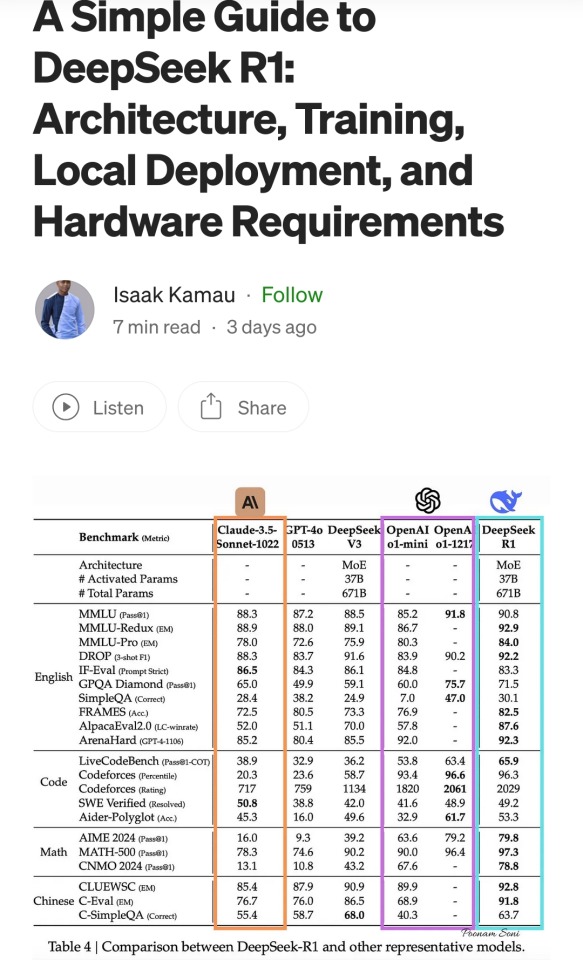
These are scores on different tests that are designed to see how accurate a Large Language Model is in different areas of knowledge. As you know, OpenAI is partners with Microsoft, so these are the scores for ChatGPT and Copilot. DeepSeek is the Chinese model that got released a week ago. The rest are open source models, which means everyone is free to use them as they please, including the average Tumblr user. You can run them from the servers of the companies that made them for a subscription, or you can download them to install locally on your own computer. However, the computer requirements so far are so high that only a few people currently have the machines at home required to run it.
Yes, this is why AI uses so much electricity. As with any technology, the early models are highly inefficient. Think how a Ford T needed a long chimney to get rid of a ton of black smoke, which was unused petrol. Over the next hundred years combustion engines have become much more efficient, but they still waste a lot of energy, which is why we need to move towards renewable electricity and sustainable battery technology. But that's a topic for another day.
As you can see from the scores, are around the same accuracy. These tests are in constant evolution as well: as soon as they start becoming obsolete, new ones are released to adjust for a more complicated benchmark. The new models are trained using different machine learning techniques, and in theory, the goal is to make them faster and more efficient so they can operate with less power, much like modern cars use way less energy and produce far less pollution than the Ford T.
However, computing power requirements kept scaling up, so you're either tied to the subscription or forced to pay for a latest gen PC, which is why NVIDIA, AMD, Intel and all the other chip companies were investing hard on much more powerful GPUs and NPUs. For now all we need to know about those is that they're expensive, use a lot of electricity, and are required to operate the bots at superhuman speed (literally, all those clickbait posts about how AI was secretly 150 Indian men in a trenchcoat were nonsense).
Because the chip companies have been working hard on making big, bulky, powerful chips with massive fans that are up to the task, their stock value was skyrocketing, and because of that, everyone started to use AI as a marketing trend. See, marketing people are not smart, and they don't understand computers. Furthermore, marketing people think you're stupid, and because of their biased frame of reference, they think you're two snores short of brain-dead. The entire point of their existence is to turn tall tales into capital. So they don't know or care about what AI is or what it's useful for. They just saw Number Go Up for the AI companies and decided "AI is a magic cow we can milk forever". Sometimes it's not even AI, they just use old software and rebrand it, much like convection ovens became air fryers.
Well, now we're up to date. So what did DepSeek release that did a 9/11 on NVIDIA stock prices and popped the AI bubble?
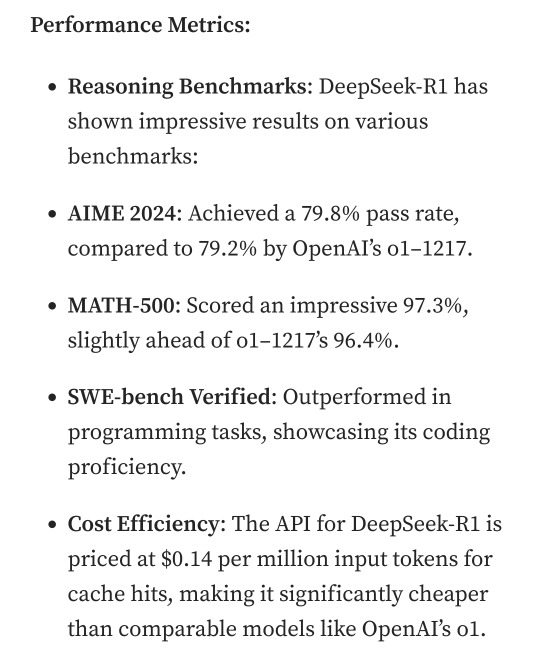
Oh, I would not want to be an OpenAI investor right now either. A token is basically one Unicode character (it's more complicated than that but you can google that on your own time). That cost means you could input the entire works of Stephen King for under a dollar. Yes, including electricity costs. DeepSeek has jumped from a Ford T to a Subaru in terms of pollution and water use.
The issue here is not only input cost, though; all that data needs to be available live, in the RAM; this is why you need powerful, expensive chips in order to-

Holy shit.
I'm not going to detail all the numbers but I'm going to focus on the chip required: an RTX 3090. This is a gaming GPU that came out as the top of the line, the stuff South Korean LoL players buy…
Or they did, in September 2020. We're currently two generations ahead, on the RTX 5090.
What this is telling all those people who just sold their high-end gaming rig to be able to afford a machine that can run the latest ChatGPT locally, is that the person who bought it from them can run something basically just as powerful on their old one.
Which means that all those GPUs and NPUs that are being made, and all those deals Microsoft signed to have control of the AI market, have just lost a lot of their pulling power.
Well, I mean, the ChatGPT subscription is 20 bucks a month, surely the Chinese are charging a fortune for-
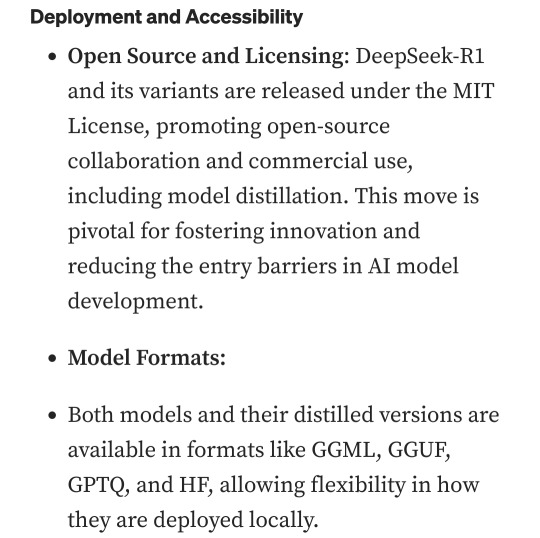
Oh. So it's free for everyone and you can use it or modify it however you want, no subscription, no unpayable electric bill, no handing Microsoft all of your private data, you can just run it on a relatively inexpensive PC. You could probably even run it on a phone in a couple years.
Oh, if only China had massive phone manufacturers that have a foot in the market everywhere except the US because the president had a tantrum eight years ago.
So… yeah, China just destabilised the global economy with a torrent file.
#valid ai criticism#ai#llms#DeepSeek#ai bubble#ChatGPT#google gemini#claude ai#this is gonna be the dotcom bubble again#hope you don't have stock on anything tech related#computer literacy#tech literacy
432 notes
·
View notes
Text
RABİSU - PLATİN (2)

In an ever-evolving digital landscape, having a reliable online presence is integral to success. At Rabisu, we specialize in delivering tailored hosting solutions that empower businesses to thrive. Our diverse range of services—spanning VPS in the UK to comprehensive web hosting—ensures that every client can find the perfect fit for their unique needs. With a focus on speed, security, and seamless performance, Rabisu is dedicated to providing you with the infrastructure necessary to scale your operations and engage with your audience effectively.
VPS UK
When it comes to vps uk hosting, Rabisu stands out for its unmatched performance and reliability. Our virtual private servers are meticulously designed to cater to businesses that require a scalable and secure hosting environment without compromising on speed or up-time.
With Rabisu, you leverage cutting-edge technology that guarantees exceptional performance, allowing your applications to run smoothly even under high traffic conditions. Our VPS solutions come with full root access, enabling you to customize your environment to meet specific needs.
Additionally, Rabisu offers flexible pricing plans that ensure you get the most bang for your buck. Whether you are a start-up or a well-established organization, our plans can be tailored to suit your requirements. We believe in providing our customers with the best value, ensuring your investment drives the desired results for your business.
With 24/7 customer support, you can rest assured knowing our expert team is always available to assist you with any issues or questions you may have. Choosing Rabisu means choosing peace of mind when it comes to managing your digital infrastructure.
Secure your VPS UK hosting today with Rabisu, and take the first step towards a more efficient and scalable online presence. Visit Rabisu to get started now!
Hosting
When it comes to reliable and efficient hosting solutions, Rabisu offers a range of options tailored specifically for your needs. With our cutting-edge VPS UK hosting, you can expect exceptional performance and stability, ensuring that your website remains online and responsive at all times.
Our hosting provides you with dedicated resources, allowing you to customize your server environment according to your unique specifications. This means you have better control over your website's performance, allowing for faster load times and a superior experience for your users.
Rabisu is committed to delivering top-tier security features with our hosting services. We implement advanced security protocols to protect your data, ensuring peace of mind while you focus on growing your business.
Furthermore, our customer support team is always available, ready to assist you 24/7. Whether you're facing a technical challenge or have questions about configuring your server, our experts are just a call or message away, guaranteeing that you are never left in the dark.
In choosing Rabisu for your VPS UK hosting needs, you are opting for reliability, flexibility, and unparalleled support; what more could you ask for? Take your website to new heights with our outstanding hosting solutions today!
468 notes
·
View notes
Text
Twisted Wonderland - Blessings and Curses
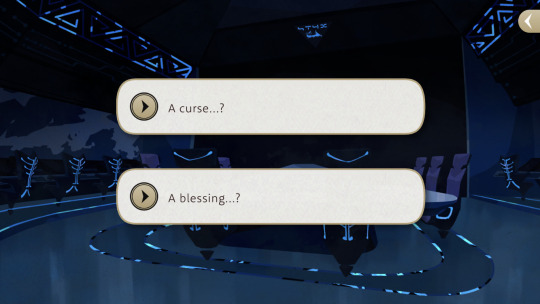
In Twst, it’s said repeatedly that blessings and curses are virtually the same thing, but are differentiated only by how they either positively or negatively affect the person who is spelled.
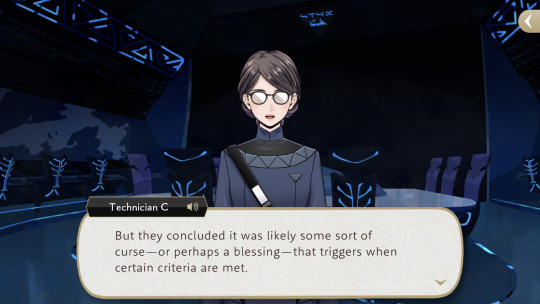
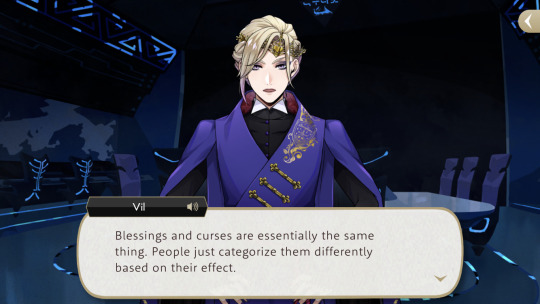
This is interesting because of this, in some cases, spells meant to be blessings turn into curses, which a number of characters suffer from. Some curses can also be a blessing.
There are now at least four characters who are canonically cursed in some form, with some being more explicitly stated as cursed, others implied, and some we don’t even know what’s truly going on, so I’ll be going over everything that we do know because this magic system is mysterious and I want to know more.
Idia Shroud, the late original Ortho Shroud, STYX’s director (Idia’s father) and the late Aidne Shroud (Idia’s grandmother) have all been generationally cursed for hundreds of years since their ancestor was punished for trying to revolt against their rivals, the Jupiter Family.
Their curse manifests itself as firey blue hair and the ability to incinerate blot at such a speed that overblot is impossible.
The inability to overblot can be interpreted as a blessing, but if the Shrouds don’t produce blot/live in close proximity to blot, the curse will attack their magic force and destroy it, possibly harming their lives as well.
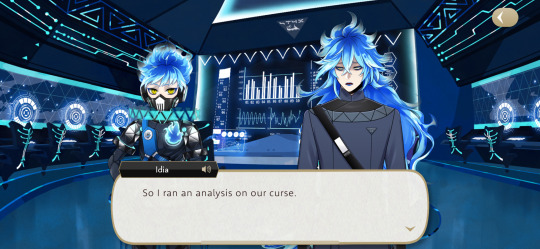


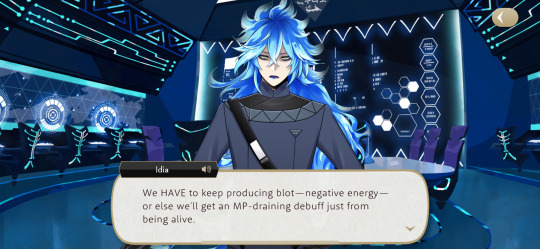
Because of this, the curse makes the Shrouds uniquely qualified for blot research and protecting the rest of the world from the massive phantoms created by hundreds of overblotters across history.
This curse prevents Idia from living a normal life and, as Idia has done research on himself and the family, concluded that it is the curse is unbreakable (as most curses appear to be)

Idia also confirms that Grim is cursed, except Grim’s curse seems to be so old and complex that he can’t decipher what it is. Grim does have blot resistance, and its theorized that he’s a direbeast fused with some other kind of animal and possesses almost human-like intelligence.
Idia is able to conclude that someone casted an ancient spell on Grim, but the person who did it and the purpose of the spell is unknown.

This, paired with Grim’s insatiable desire to eat blot stones produced by overblotters, hasn’t been touched upon by the plot again as of right now, but the chimera creature that resembles Grim from the prologue is an indicator that we will find out what this curse is at some point.
Next is Silver’s curse, which is different from everyone else because it was intended to be a blessing from the very start.
And it was a blessing for around 400 years…Until he woke up and started experiencing negative effects from the spell, which made it a curse.



This is more on the theorizing side since Silver’s sleeping problem is brought up only once in Book 7 and not touched on again. By the end of Book 7, his sleeping issue still isn’t talked about. Given the new guest room and chat voice lines that just dropped on JPN server, it’s implied that Silver is still struggling with his uncontrollable sleeping habit and he is not cured of his curse.
But again, we won’t know if that’s actually the case until the story continues.
People rightfully speculate that the reason behind his sleeping issue comes from his original blessing, which was to sleep until found by someone who loves him. He was in ageless sleep until he was found by Lilia, and then he started to age like a normal child but fell asleep suddenly with no explanation.
It’s stated multiple times in vignettes and once in main story that Silver has been taken to doctors for his sleeping issue and no one was able to find anything, implying that curses are virtually undetectable outside of the STYX technology Idia has access to.



The blessing met its criteria and him being awake proves that it has been broken, but the reason why he’s experiencing negative effects from something that saved his life is unknown and hopefully it’ll be explained later on. Lilia also theorizes that the spell may have fallen apart due to how unpredictably long he spent under it, but that was probably just him assuming he didn't meet the spell's criteria.
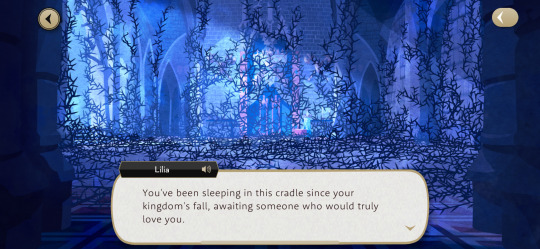
Given what we know, I theorize that, in some cases, excessive amounts of exposure to powerful magic can be harmful to people, especially humans who were spelled at such a young age.
This is how a blessing can change into a curse, it’s now a part of him whether he wants it there or not.
Maybe his body is just used to being asleep, he was like that for 400 years and has only been awake for 18 years. Maybe there’s something else at play, we don’t know.
We have enough evidence to assume that he’s part of the cursed club (also he’s twisted from Aurora who is very famously cursed lol)
But he’s in the same place as Grim where you know it’s there but you’re not entirely sure why.
Lastly, Malleus has joined the cursed club as of the end of Book 7.
The Senate “blessed” him, and their intention truly was blessing. However, the effects of the blessings have become more of a curse to Malleus.
Malleus himself even interprets himself as cursed.

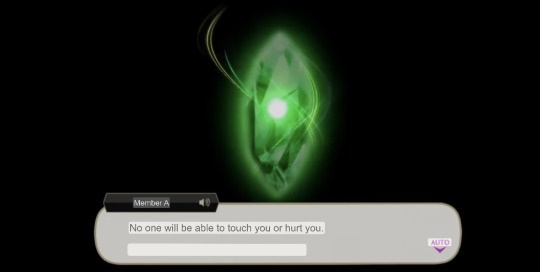

He was blessed to be so powerful that no one could do him any harm, however, because of his power he was harming everyone around him, including his loved ones, which is something that kept Malleus isolated and repressed.
Because the curse hindered his ability to express emotion, he was robbed of what he actually wanted, which was the ability to be happy, sad, and being able to hug someone without the fear of hurting them.
Malleus is the best example of blessings and curses being virtually the same thing. What was a blessing in the eyes of the senate was a curse in Malleus’s perspective.
Because of what happened, Malleus’s curse isn’t ‘broken’ per se, but he can no longer physically perform the kind of magic he was able to perform when both his horns were intact.
I don’t know if there’s anything Idia, Grim and Silver can do to break the effects of their curses but we’ll have to see as the story goes on.
IN CONCLUSION, having consequences to powerful spells and an open interpretation of how magic can both save and harm someone simultaneously is a really interesting aspect of Twisted Wonderland that I hope gets expanded upon in the future.
#twst#twst spoilers#twisted wonderland#twst chapter 7#twst analysis#there's a chance we'll never know more BUT a girl can dream#Idia Shroud#twst Grim#Silver Vanrouge#Malleus Draconia#oddberry analysis
348 notes
·
View notes
Text
Teledystopia
@teidar dropped this in our Discord server this morning, and it reminded me of something from my middle school years.

Back in the '70s, we had an assembly at my school to listen to a presentation by some shill from The Phone Company about telephone technology and the Dazzling Amazing Future of Telecommunications.
(Like I said, it was the '70s.)
It included a pretty accurate version of compact portable phone technology.
"You'll never be out of touch! People will always be able tp reach you, wherever you are! You could be surfing on the beach at Maui, and your boss could call you to talk about work!"
He seemed utterly baffled when someone asked, "what if you don't want people to call you? Who wants their boss to call them on vacation?"
How could anyone not want this glorious future utopia of constant communication?
I will note that his version of Amazing Future Phones were strapped to your wrist at all times. Someone asked, "couldn't you just take your phone off and leave it in your hotel room?" and he answered, "well, no, you couldn't."
I suspect that whoever wrote up his presentation never really thought about these questions, but I've never forgotten that at least one guy at The Phone Company literally wanted to chain these fucking things to your wrist.
#cell phone#landlines#teledystopia#AT&T#The Phone Company#this was back before the break-up so there was really only one
220 notes
·
View notes
Note
Is AWAY using it's own program or is this just a voluntary list of guidelines for people using programs like DALL-E? How does AWAY address the environmental concerns of how the companies making those AI programs conduct themselves (energy consumption, exploiting impoverished areas for cheap electricity, destruction of the environment to rapidly build and get the components for data centers etc.)? Are members of AWAY encouraged to contact their gov representatives about IP theft by AI apps?
What is AWAY and how does it work?
AWAY does not "use its own program" in the software sense—rather, we're a diverse collective of ~1000 members that each have their own varying workflows and approaches to art. While some members do use AI as one tool among many, most of the people in the server are actually traditional artists who don't use AI at all, yet are still interested in ethical approaches to new technologies.
Our code of ethics is a set of voluntary guidelines that members agree to follow upon joining. These emphasize ethical AI approaches, (preferably open-source models that can run locally), respecting artists who oppose AI by not training styles on their art, and refusing to use AI to undercut other artists or work for corporations that similarly exploit creative labor.
Environmental Impact in Context
It's important to place environmental concerns about AI in the context of our broader extractive, industrialized society, where there are virtually no "clean" solutions:
The water usage figures for AI data centers (200-740 million liters annually) represent roughly 0.00013% of total U.S. water usage. This is a small fraction compared to industrial agriculture or manufacturing—for example, golf course irrigation alone in the U.S. consumes approximately 2.08 billion gallons of water per day, or about 7.87 trillion liters annually. This makes AI's water usage about 0.01% of just golf course irrigation.
Looking into individual usage, the average American consumes about 26.8 kg of beef annually, which takes around 1,608 megajoules (MJ) of energy to produce. Making 10 ChatGPT queries daily for an entire year (3,650 queries) consumes just 38.1 MJ—about 42 times less energy than eating beef. In fact, a single quarter-pound beef patty takes 651 times more energy to produce than a single AI query.
Overall, power usage specific to AI represents just 4% of total data center power consumption, which itself is a small fraction of global energy usage. Current annual energy usage for data centers is roughly 9-15 TWh globally—comparable to producing a relatively small number of vehicles.
The consumer environmentalism narrative around technology often ignores how imperial exploitation pushes environmental costs onto the Global South. The rare earth minerals needed for computing hardware, the cheap labor for manufacturing, and the toxic waste from electronics disposal disproportionately burden developing nations, while the benefits flow largely to wealthy countries.
While this pattern isn't unique to AI, it is fundamental to our global economic structure. The focus on individual consumer choices (like whether or not one should use AI, for art or otherwise,) distracts from the much larger systemic issues of imperialism, extractive capitalism, and global inequality that drive environmental degradation at a massive scale.
They are not going to stop building the data centers, and they weren't going to even if AI never got invented.
Creative Tools and Environmental Impact
In actuality, all creative practices have some sort of environmental impact in an industrialized society:
Digital art software (such as Photoshop, Blender, etc) generally uses 60-300 watts per hour depending on your computer's specifications. This is typically more energy than dozens, if not hundreds, of AI image generations (maybe even thousands if you are using a particularly low-quality one).
Traditional art supplies rely on similar if not worse scales of resource extraction, chemical processing, and global supply chains, all of which come with their own environmental impact.
Paint production requires roughly thirteen gallons of water to manufacture one gallon of paint.
Many oil paints contain toxic heavy metals and solvents, which have the potential to contaminate ground water.
Synthetic brushes are made from petroleum-based plastics that take centuries to decompose.
That being said, the point of this section isn't to deflect criticism of AI by criticizing other art forms. Rather, it's important to recognize that we live in a society where virtually all artistic avenues have environmental costs. Focusing exclusively on the newest technologies while ignoring the environmental costs of pre-existing tools and practices doesn't help to solve any of the issues with our current or future waste.
The largest environmental problems come not from individual creative choices, but rather from industrial-scale systems, such as:
Industrial manufacturing (responsible for roughly 22% of global emissions)
Industrial agriculture (responsible for roughly 24% of global emissions)
Transportation and logistics networks (responsible for roughly 14% of global emissions)
Making changes on an individual scale, while meaningful on a personal level, can't address systemic issues without broader policy changes and overall restructuring of global economic systems.
Intellectual Property Considerations
AWAY doesn't encourage members to contact government representatives about "IP theft" for multiple reasons:
We acknowledge that copyright law overwhelmingly serves corporate interests rather than individual creators
Creating new "learning rights" or "style rights" would further empower large corporations while harming individual artists and fan creators
Many AWAY members live outside the United States, many of which having been directly damaged by the US, and thus understand that intellectual property regimes are often tools of imperial control that benefit wealthy nations
Instead, we emphasize respect for artists who are protective of their work and style. Our guidelines explicitly prohibit imitating the style of artists who have voiced their distaste for AI, working on an opt-in model that encourages traditional artists to give and subsequently revoke permissions if they see fit. This approach is about respect, not legal enforcement. We are not a pro-copyright group.
In Conclusion
AWAY aims to cultivate thoughtful, ethical engagement with new technologies, while also holding respect for creative communities outside of itself. As a collective, we recognize that real environmental solutions require addressing concepts such as imperial exploitation, extractive capitalism, and corporate power—not just focusing on individual consumer choices, which do little to change the current state of the world we live in.
When discussing environmental impacts, it's important to keep perspective on a relative scale, and to avoid ignoring major issues in favor of smaller ones. We promote balanced discussions based in concrete fact, with the belief that they can lead to meaningful solutions, rather than misplaced outrage that ultimately serves to maintain the status quo.
If this resonates with you, please feel free to join our discord. :)
Works Cited:
USGS Water Use Data: https://www.usgs.gov/mission-areas/water-resources/science/water-use-united-states
Golf Course Superintendents Association of America water usage report: https://www.gcsaa.org/resources/research/golf-course-environmental-profile
Equinix data center water sustainability report: https://www.equinix.com/resources/infopapers/corporate-sustainability-report
Environmental Working Group's Meat Eater's Guide (beef energy calculations): https://www.ewg.org/meateatersguide/
Hugging Face AI energy consumption study: https://huggingface.co/blog/carbon-footprint
International Energy Agency report on data centers: https://www.iea.org/reports/data-centres-and-data-transmission-networks
Goldman Sachs "Generational Growth" report on AI power demand: https://www.goldmansachs.com/intelligence/pages/gs-research/generational-growth-ai-data-centers-and-the-coming-us-power-surge/report.pdf
Artists Network's guide to eco-friendly art practices: https://www.artistsnetwork.com/art-business/how-to-be-an-eco-friendly-artist/
The Earth Chronicles' analysis of art materials: https://earthchronicles.org/artists-ironically-paint-nature-with-harmful-materials/
Natural Earth Paint's environmental impact report: https://naturalearthpaint.com/pages/environmental-impact
Our World in Data's global emissions by sector: https://ourworldindata.org/emissions-by-sector
"The High Cost of High Tech" report on electronics manufacturing: https://goodelectronics.org/the-high-cost-of-high-tech/
"Unearthing the Dirty Secrets of the Clean Energy Transition" (on rare earth mineral mining): https://www.theguardian.com/environment/2023/apr/18/clean-energy-dirty-mining-indigenous-communities-climate-crisis
Electronic Frontier Foundation's position paper on AI and copyright: https://www.eff.org/wp/ai-and-copyright
Creative Commons research on enabling better sharing: https://creativecommons.org/2023/04/24/ai-and-creativity/
210 notes
·
View notes
Text
"Oh shit, my career!" shouted one of the interns in the bullpen when it becomes obvious immediately what had happened. Yes, Justin. You had now learned a new and uncomfortable truth about working for the Man, and your working life will never be the same again. And it all started because he didn't follow the mandatory security training that every employee needs to click through while half-paying attention.
Yes indeed. In a past life, I was an information-technology security specialist. For those of you in the back who have led worthwhile existences, these words may not make sense to you. Others are not so lucky, and at this moment are rolling their eyes, or looking for the closest exits. We are, or were, the folks who force you to use a password that isn't "password," and stop sending emails containing the company's bank information to Inner Somalia.
Being in information security is a lot like being a regular old computer nerd, except you're also incredibly paranoid. Imagine you live in a house full of vicious, murderous ghosts that only you can see, and all your family members keep doing horror movie cliche shit like leaving the doors open, shaking genie lamps they find in the parking lot, and reciting "Bloody Mary" three times into a bathroom mirror. You gotta keep them safe, which slowly drives you insane over the course of, oh, about your first six weeks of employment. After that, you've basically just given up and are like the hardened firefighters who respond to grisly highway accidents with an encyclopedic knowledge of what kind of solvent cleans what kind of human fluid off the roadway.
Back to Justin: part of our paranoia involved doing elaborate role-playing exercises. Some of our nerds would pretend to be a different kind of nerd, and try to talk themselves into places they didn't belong. The idea is that a horrible criminal or cyberterrorist could also use this rarefied power ("Hi, I'm the guy who is supposed to fix the servers. They're not serving. Please show me where the servers are, and leave me alone with them for several hours") and we needed to figure out who was dumb enough to fall for it. Justin was dumb enough to fall for it.
If only he had paid attention to the mandatory security quiz that we made him click through, this all could have been avoided. Everything ended up well for him, though. The whole experience made Justin incredibly, violently paranoid, which made him a perfect candidate to become a information technology security specialist. The system works!
349 notes
·
View notes